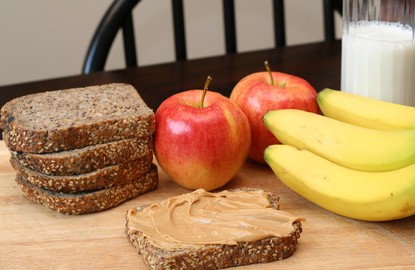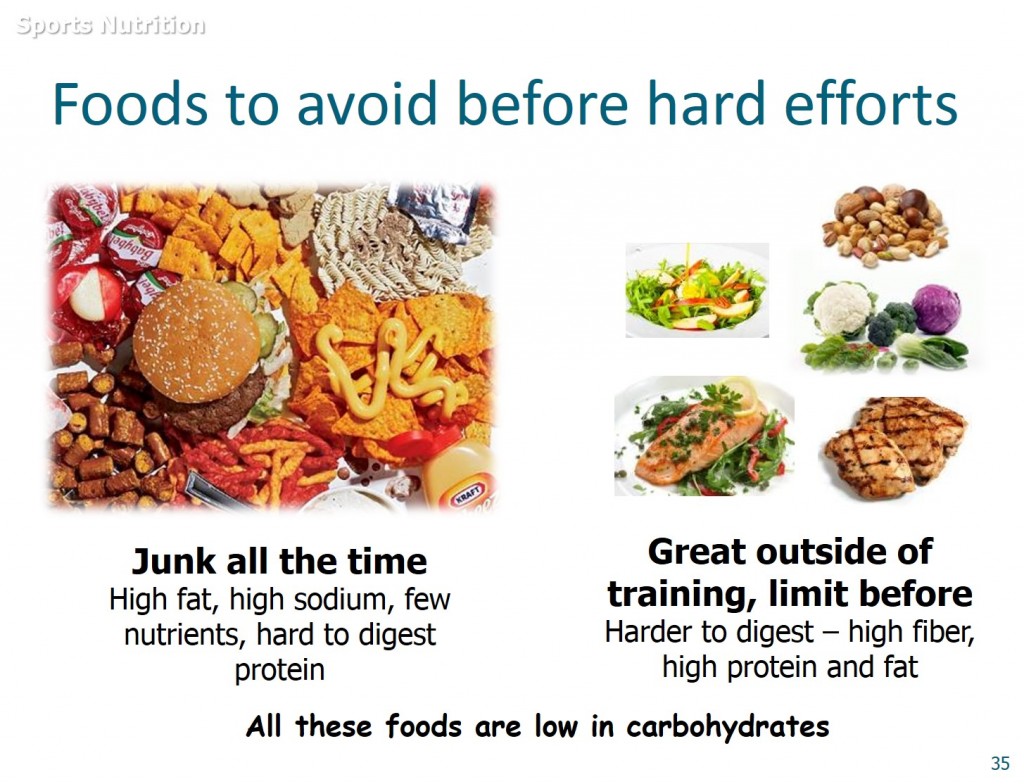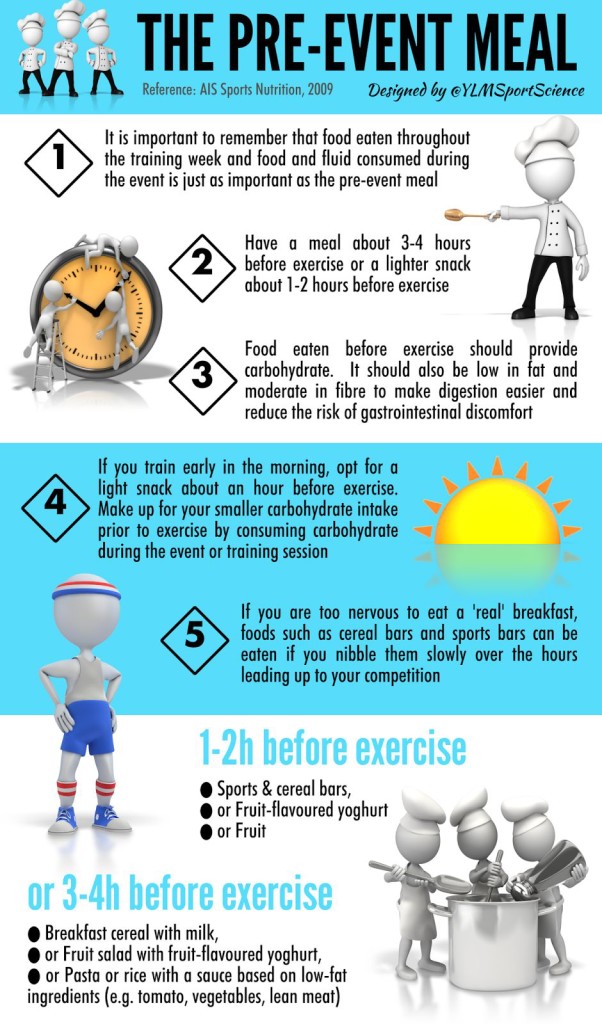Eating before exercising can be tricky: figuring out how to fuel for workouts in the early morning, lunch breaks, or supper-time takes some planning and practice. But it’s definitely worth finding a plan that works for you, since the food you eat before your workout has many benefits besides curbing hunger: it can help fuel your muscles and brain, top off your glycogen stores, increase motivation, decrease perceived exertion, boost your endurance and performance, and set the stage for faster post-workout recovery. On the other hand, what you eat (or don’t eat!) can also lead to lightheadedness, fatigue, cramping, or gastric distress.
Here are some tips to help you do it right. . .
What to Eat
Carbohydrate-rich foods or beverages are your best bet before exercise. These foods tend to digest well and quickly, so you won’t have as much in your gut while you’re exercising. Carbohydrates are an athlete’s main source of energy, stored in muscles as glycogen, or circulating in your bloodstream as glucose.
What not to eat: Limit heavy proteins and fatty foods before exercising (meats, greasy foods, cheeses) since they take longer to digest. Spicy foods and very high fiber foods are also best to avoid (whole grain breads, cereals, and most fruits are probably fine – and preferable to refined foods – for most, but best to avoid gas-producing foods like beans/legumes and cabbage).
Won’t carbohydrates cause my blood sugar to crash and make me tired? While it is true that carbohydrates will increase insulin and blood sugar, followed by a decrease in blood sugar at the beginning of exercise, studies have shown that this dip in blood sugar is short lived and doesn’t affect overall energy levels. The performance benefits of ingesting carbohydrates far outweigh the small and temporary decrease in blood sugar. However, some individuals are more sensitive than others to increases in insulin. These individuals should try consuming carbohydrates with a lower glycemic index (i.e.,slower digesting carbohydrates that cause less of an increase in blood sugar). Also, consuming carbohydrates (e.g., sports drink) during activity can offset drops in blood glucose.
Protein. Research suggests that including a small amount of protein in your pre-workout meal can help support muscle repair and growth. Good choices for most athletes that are well-tolerated before exercise include low-fat or non-fat dairy products like yogurt and milk, nut butters, or eggs. Decrease the protein content of your meal in favour of carbohydrates as you get closer to your workout time.
Fluids. Start your exercise with optimal fluid levels. Water, milk, soymilk, or unsweetened fruit juices are good options. Liquid/blender meals (e.g., fruit smoothies) can cover fluid and carbohydrate needs, are convenient, and tend to digest well.
Timing
Here’s a scenario for timing pre-workout meals and snacks.
- 3-4 hours before training: eat your last big meal– which should favour carbohydrates but also include protein and fat.
- Within 2 hours of training: eat a carbohydrate-rich snack and/or beverage.
- 60 minutes to start of workout – drink sports drink or water and a very light snack
When this timing isn’t practical, pay more attention to your food choices and portions. Generally the closer you are to your workout time, the fewer calories you should consume. Stick to higher carbohydrate foods or liquids that you tolerate well.
 Morning Workout: While you sleep, liver glycogen can deplete by as much as 80 percent. Eating something before morning workouts will help stave off fatigue – even a light snack will help. Some people can tolerate a decent-sized breakfast with no ill effects. If you don’t have time, or you can’t stomach food before early workouts, be sure you consume something like a sports drink during exercise to provide the fuel and liquids you need.
Morning Workout: While you sleep, liver glycogen can deplete by as much as 80 percent. Eating something before morning workouts will help stave off fatigue – even a light snack will help. Some people can tolerate a decent-sized breakfast with no ill effects. If you don’t have time, or you can’t stomach food before early workouts, be sure you consume something like a sports drink during exercise to provide the fuel and liquids you need.
Evening Workout: If your last meal was at noon, you’ll need to eat before heading out to exercise. Depending on the intensity and time of the workout, a full meal might not be possible. Be sure to consume a healthy carbohydrate-based snack, or a smaller portion of more traditional supper foods that you know sit well. If possible, you might want to change your meal time to benefit your workout. For example, if your evening workout is at 6:30, try to eat lunch at 2:30, have a light snack at 4:30, and sports drink, diluted juice, or water and another light snack within an hour of your workout.
This study found that athletes performed poorer at night when they didn’t eat breakfast – something to consider if you’ve got an evening workout or race.
Here’s a graphic to help you figure out what to eat before intense training or racing. Athletes vary quite a bit in what they can tolerate, so be sure to practice in training or time trials so you can figure it out before important events.
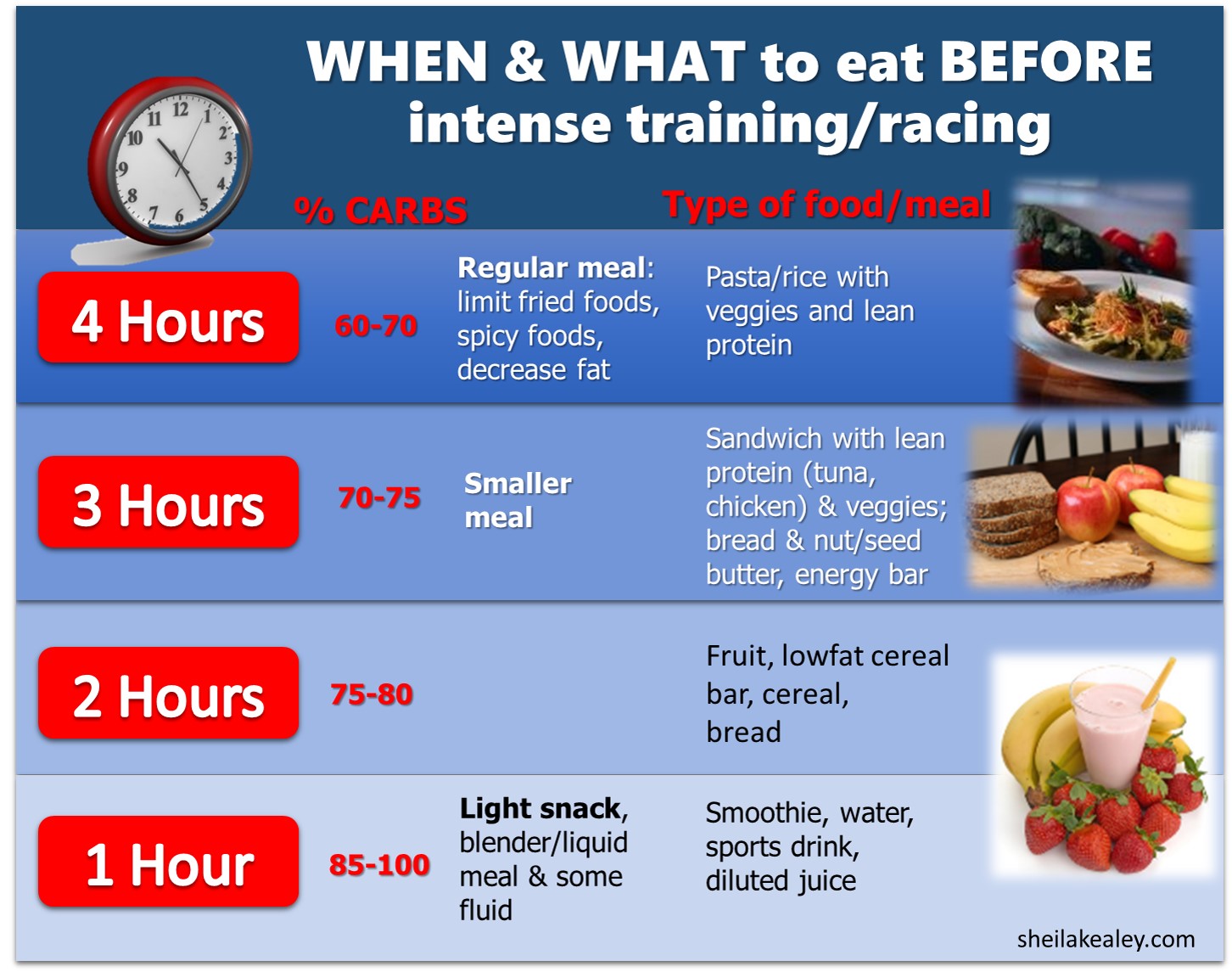 Pre-workout Snack Ideas
Pre-workout Snack Ideas
These types of foods are popular with many athletes and suitable to consume within 2 hours of a workout. Experiment and find out what works for you.
- Peanut butter and banana sandwich on whole grain bread or bagel
- Banana topped with 1 tbsp. nut/seed butter
- 1 cup breakfast cereal topped with lowfat milk or soymilk and ½ cup fruit
- Fruit smoothie: Blend 1 cup milk or soymilk, 1 banana, ½ cup frozen strawberries or blueberries
- 1 cup yogurt with 1 cup chopped fruit or berries
- Pita with hummus, vegetable juice
- Whole grain bagel or bread topped with tomato slices and low-fat cheese
Tummy Troubles?
Intense exercise diverts blood flow from the stomach to the working muscles, which can interfere with digestion. This can lead to cramping, bloating, and nausea in some individuals. If you suffer GI problems during activity, consider the following:
- Choose your pre-workout foods carefully, limiting high fiber foods, spicy foods, heavy proteins, and fatty foods.
- Allow enough time between eating and exercising – experiment with different time windows
- Eat familiar foods that you know won’t upset your stomach (e.g., low-fiber cereals with lowfat milk, applesauce, low-fat yogurt, bread or bagels and jam, or bananas)
- Stick to small portions of easily digested carbohydrates like breads, pasta, and rice
- Liquid meals are generally well tolerated and empty the gut quicker than solid foods (e.g., blend milk, banana, other fruit).
- Sports drinks are also generally well tolerated, especially in the hour before training since they exit into the small intestine sooner and are absorbed quicker.
Also, you might want to consult this recent review on gastrointestinal issues in athletes.
Race Day Nerves
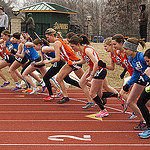 Even with practiced eating routines, pre-competition nerves can wreak havoc on the heartiest of stomachs. In addition, high intensity efforts often require modifying your pre-exercise diet. Generally, follow the guidelines above for “tummy troubles,” and when in doubt eat less, and opt for liquid calories.
Even with practiced eating routines, pre-competition nerves can wreak havoc on the heartiest of stomachs. In addition, high intensity efforts often require modifying your pre-exercise diet. Generally, follow the guidelines above for “tummy troubles,” and when in doubt eat less, and opt for liquid calories.
Finding what works for you
Use these pre-workout eating strategies as a guide, but keep in mind that food preferences and tolerances vary quite a bit among individuals. Also, what you can eat may depend on the activity (e.g., cyclists can generally tolerate more food in their stomachs than runners). Intensity has a great influence too: you can get away with eating more food and a variety of foods before an easy workout compared to a time trial or intervals. Try out different foods, portions, and timing in training, and find out what works best for you.
Also, beyond your pre-workout foods, remember that your overall diet is critical to good health.
Although engineered products (e.g., sports drinks, bars, gels) are convenient and well-formulated forms of fuel for exercise, they are mostly refined carbohydrates and not the foundation of a good diet.
Aim for an overall diet that includes plenty of vegetables, fruits, whole grains, legumes, and healthy fats. These foods are important for good health, will help fight disease, and boost your immune system.
For optimal recovery, follow-up your activity with healthful post-workout foods.
Summary
This infographic by exercise physiologist Yann Le Meur provides a nice summary of eating before exercise, based on a fact sheet by the Australian Institute of Sport.
More Sports Nutrition Articles
- Nutrition Strategies for Health and Athletic Performance
- Dietary Nitrates, Sports Performance, and Health
- Athletes Avoiding Gluten and Grains: Is There Good Evidence?
- The Iron Needs of Athletes: Who Needs More, and How to Get it Through Your Diet
- Healthy or Hype? Chocolate Milk for Recovery
- How Much Protein Do You Need?
- Energy Bars: What to Look for, Real Food Alternatives, and How to Make Your Own
- Will Beet Juice Improve Endurance Performance?
- Refueling for Recovery
- You Fuel your Workouts, but How Does the Rest of your Diet Stack Up?
_____________
Track Photo by COD Newsroom
Updated April 7, 2015
Share This:
